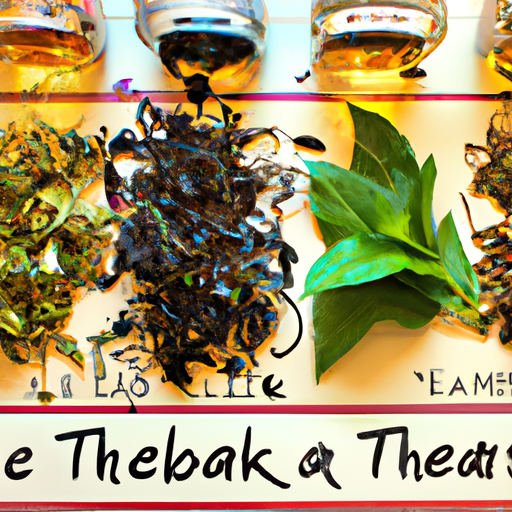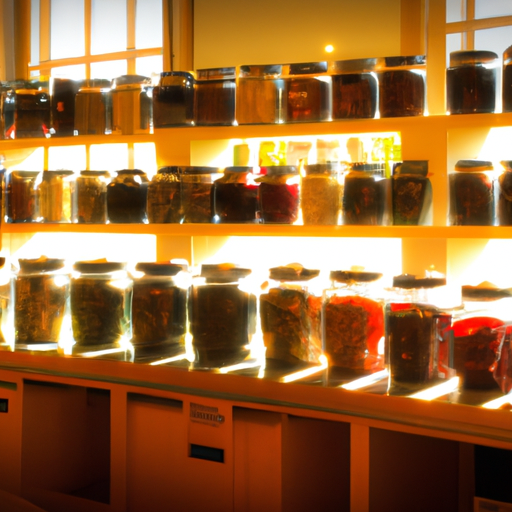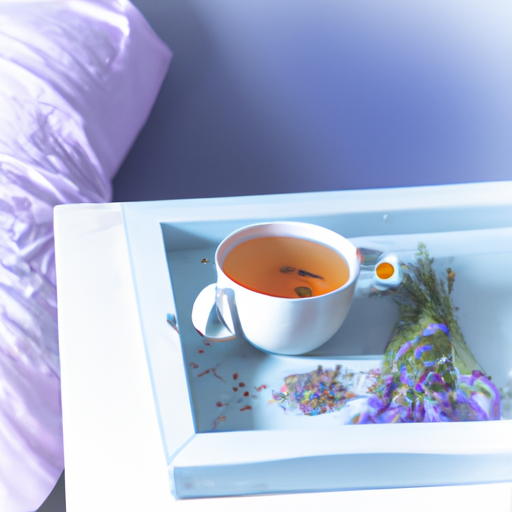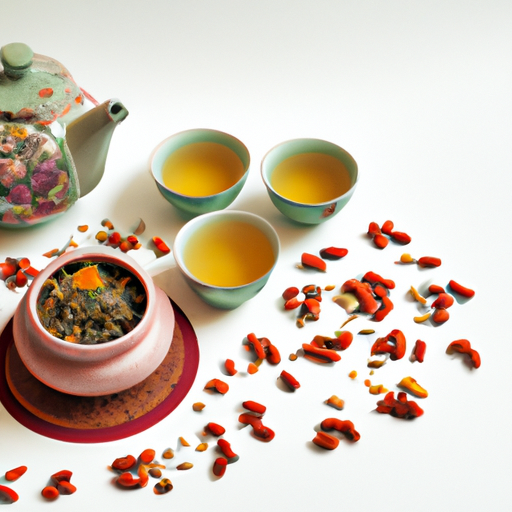Picture this: you’re sitting on a cozy armchair, wrapped in a soft blanket, with a steaming cup of herbal tea in your hands. Ah, the simple pleasure of sipping a warm and soothing beverage.
But with so many options out there, where should you start? Fear not, fellow tea enthusiasts, for I am here to guide you on your herbal tea journey.
Firstly, let’s delve into the world of chamomile tea. Known for its calming properties, this gentle brew is perfect for winding down after a long day.
Next up, we have peppermint tea. Its refreshing taste and digestive benefits make it a popular choice for those looking for a natural pick-me-up.
If you’re a fan of antioxidants, then green tea is the way to go. Packed with health benefits, this powerhouse tea is known for its earthy flavor and ability to boost metabolism.
For a caffeine-free option, try rooibos tea. Its sweet and nutty taste is sure to please.
Ginger tea, with its spicy kick and immune-boosting properties, is another great choice. Lemon balm tea, on the other hand, offers a citrusy flavor and is said to promote relaxation.
And last but not least, hibiscus tea, with its vibrant color and tangy taste, is a delightful option for those seeking a refreshing and fruity brew.
So, whether you’re seeking tranquility, a burst of energy, or a myriad of health benefits, there’s a herbal tea out there that’s perfect for you.
Let’s embark on this aromatic adventure together and discover the best herbal tea to start with.
Key Takeaways
- Chamomile tea is a great herbal tea to start with as it is calming and promotes better sleep.
- Peppermint tea is another good option for beginners as it alleviates digestive issues and boosts energy.
- Green tea is a popular choice that is rich in antioxidants and boosts metabolism.
- Rooibos tea is a caffeine-free alternative with numerous health benefits, making it a great choice for those looking to avoid caffeine.
Chamomile Tea
If you’re looking for a soothing and relaxing herbal tea to unwind after a long day, chamomile tea is the perfect choice for you. Chamomile tea is known for its calming properties and is often used to promote relaxation and sleep. It’s been used for centuries as a natural remedy for various ailments.
One of the main benefits of chamomile tea is its ability to help reduce anxiety and promote better sleep. It contains a compound called apigenin, which is believed to have a sedative effect on the brain.
In addition to its calming effects, chamomile tea also offers a range of other health benefits. It’s rich in antioxidants, which can help to reduce inflammation in the body and protect against chronic diseases. Chamomile tea is also known to have antibacterial properties, which can help to boost the immune system and fight off infections.
There are many ways to enjoy chamomile tea. You can simply steep the dried flowers in hot water for a few minutes, or you can try one of the many chamomile tea recipes available online. Some popular recipes include chamomile and honey tea, chamomile lavender iced tea, and chamomile lemonade.
Transitioning into the subsequent section about peppermint tea, another popular herbal tea option…
Peppermint Tea
When you dive into the refreshing world of herbal infusions, one delightful option to explore is the invigorating embrace of peppermint tea. Known for its refreshing taste and soothing aroma, peppermint tea offers a range of benefits to both your body and mind.
Sipping on a warm cup of peppermint tea can help alleviate digestive issues such as bloating, cramping, and indigestion. It has also been known to relieve headaches and migraines due to its natural muscle relaxant properties. Additionally, peppermint tea can provide a natural energy boost, making it a great alternative to caffeinated beverages.
Aside from its numerous benefits, it’s important to be aware of potential side effects. Peppermint tea may cause heartburn or acid reflux in some individuals, especially if consumed in large quantities. It is also not recommended for those with gastroesophageal reflux disease (GERD). Additionally, peppermint tea may interact with certain medications, so it’s always best to consult with a healthcare professional if you have any concerns.
Now, let’s transition to the next topic: green tea.
Green Tea
Green tea is a fantastic choice if you’re looking to add more antioxidants to your diet. It’s rich in catechins, a type of antioxidant that helps protect your cells from damage. Additionally, green tea has been shown to boost metabolism, making it a great beverage to incorporate into your weight loss journey.
Rich in Antioxidants
Experience the incredible power of herbal teas, bursting with antioxidants to nourish your body and invigorate your soul. Antioxidants play a crucial role in promoting overall health by protecting our cells from damage caused by harmful free radicals. They help reduce inflammation, boost the immune system, and even prevent chronic diseases like heart disease and cancer. Incorporating herbal teas into your daily routine is a simple and delicious way to maximize your antioxidant intake. Below is a table showcasing some popular herbal teas and their antioxidant content:
| Herbal Tea | Antioxidant Content (per cup) |
|---|---|
| Green Tea | 100-200 mg |
| Rooibos Tea | 50-100 mg |
| Chamomile Tea | 20-50 mg |
| Hibiscus Tea | 30-40 mg |
By regularly enjoying herbal teas, you can support your body’s natural detoxification processes and boost your overall well-being. Next, we’ll explore how herbal teas can also aid in boosting metabolism and supporting weight loss.
Boosts Metabolism and Supports Weight Loss
Drinking herbal teas can help boost metabolism and aid in weight loss. Studies show that regular consumption can increase calorie burn by up to 4-5% per day.
In addition to its potential weight loss benefits, herbal tea offers a multitude of other advantages for overall wellness and relaxation. Certain herbal tea blends are known for their stress relief and mental clarity properties, making them excellent choices to incorporate into your daily routine.
For example, chamomile tea is renowned for its calming effects, helping to reduce anxiety and promote better sleep. Peppermint tea can aid digestion and soothe an upset stomach. Green tea is rich in antioxidants and can improve brain function.
These are just a few examples of the many benefits herbal teas can provide.
Now, let’s explore the wonders of rooibos tea.
Rooibos Tea
Rooibos tea is a fantastic choice for those looking for a naturally caffeine-free option. It’s a herbal tea that’s made from the leaves of the Rooibos plant, which is native to South Africa.
Not only is it a great alternative to traditional teas, but it also offers numerous health benefits. Rooibos tea is known to support the immune system and promote digestive health, making it a wonderful addition to any wellness routine.
Naturally Caffeine-Free
Naturally caffeine-free herbal teas are a great choice for those seeking a comforting and soothing beverage without the jitters. These herbal teas not only provide a wide range of health benefits but also offer a delicious and relaxing way to unwind.
When choosing the right herbal tea for your needs, consider these factors:
-
Health benefits of herbal tea: Herbal teas are known for their various health benefits, such as improving sleep quality, reducing inflammation, boosting the immune system, and aiding digestion.
-
Taste preferences: Different herbal teas have distinct flavors, so it’s important to select one that appeals to your taste buds. Whether you prefer a floral, fruity, or earthy taste, there is an herbal tea out there for you.
-
Personal health concerns: Some herbal teas specifically target certain health issues, such as chamomile for stress relief or peppermint for soothing digestive problems. Consider your specific health concerns when choosing an herbal tea.
-
Experimentation: Don’t be afraid to try different herbal teas to find your favorite. With a vast array of options available, exploring new flavors can be an enjoyable and educational experience.
Naturally caffeine-free herbal teas offer a multitude of health benefits and a delightful taste.
Now, let’s explore how they can support immune system and digestive health.
Supports Immune System and Digestive Health
Moving on from discussing naturally caffeine-free herbal teas, let’s explore the benefits of herbal tea for stress relief and the role it plays in promoting better sleep. Herbal teas are not only soothing and comforting but also offer various health benefits for both our immune system and digestive health. They contain natural compounds that can support our body’s defenses and aid in digestion. Additionally, herbal teas have been known to provide a calming effect on our nervous system, reducing stress and anxiety. They can also help improve sleep quality and promote relaxation, making them an excellent choice for those struggling with sleep issues. To illustrate the wide range of herbal teas available and their respective benefits, consider the following table:
| Herbal Tea | Benefits |
|---|---|
| Chamomile | Calming and aids in digestion |
| Peppermint | Relieves digestive discomfort and stress |
| Lemon balm | Reduces anxiety and promotes restful sleep |
| Lavender | Soothes nerves and encourages relaxation |
| Valerian root | Helps with insomnia and induces deep sleep |
Now, let’s delve into the remarkable properties of ginger tea.
Ginger Tea
To begin your herbal tea journey, why not try a soothing cup of ginger tea that warms your body and invigorates your senses with its spicy and aromatic flavors? Ginger tea has been used for centuries to aid digestion and promote overall digestive health. It contains compounds that can help stimulate the production of digestive enzymes, improve absorption of nutrients, and reduce inflammation in the gut.
Additionally, ginger tea is known for its immune-boosting properties, making it a great choice for cold and flu relief. Its natural anti-inflammatory and antioxidant properties can help alleviate symptoms such as sore throat, congestion, and nausea. Whether you’re looking to soothe an upset stomach or simply enjoy a flavorful and comforting cup of tea, ginger tea is a fantastic option.
Now, let’s move on to another delightful herbal tea, lemon balm tea, that offers a different set of health benefits.
Lemon Balm Tea
Lemon balm tea, with its refreshing citrusy aroma and calming properties, provides a delightful way to relax and unwind after a long day. Made from the leaves of the lemon balm plant, this herbal tea has been used for centuries for its numerous health benefits.
Here are some benefits of lemon balm tea:
-
Relaxation: Lemon balm tea is known for its soothing properties, helping to calm the mind and reduce stress and anxiety.
-
Digestive health: This tea can aid digestion and relieve symptoms such as bloating and indigestion.
-
Sleep aid: Lemon balm tea promotes better sleep by reducing insomnia and restlessness.
To make lemon balm tea at home, follow these simple steps:
-
Gather fresh lemon balm leaves or use dried leaves.
-
Boil water and pour it over the leaves.
-
Let it steep for about 5-10 minutes.
Strain the tea and enjoy it hot or cold.
Moving on to hibiscus tea, another popular herbal option that offers a range of health benefits…
Hibiscus Tea
With its vibrant crimson color and tangy flavor, hibiscus tea is like a refreshing burst of tropical sunshine in a cup. Not only does it taste delicious, but hibiscus tea also offers potential health benefits. It’s rich in antioxidants, which help protect the body against cell damage and reduce the risk of chronic diseases.
Some studies suggest that hibiscus tea may lower blood pressure and cholesterol levels, as well as improve heart health. Additionally, it may have diuretic properties that can aid in weight loss and help with digestion.
To make hibiscus tea at home, start by boiling water in a pot. Once the water reaches a rolling boil, turn off the heat and add dried hibiscus flowers or tea bags. Let it steep for about 5-10 minutes, depending on how strong you prefer your tea. Strain the tea into a cup and add sweeteners like honey or sugar if desired. You can enjoy it hot or pour it over ice for a refreshing iced tea.
As with any herbal tea, it’s important to be aware of possible side effects. Hibiscus tea may interact with certain medications, so it’s advisable to consult with a healthcare professional if you have any concerns. Additionally, excessive consumption of hibiscus tea may cause an upset stomach or dizziness in some individuals. Moderation is key when enjoying this delightful tropical beverage.
Frequently Asked Questions
Can pregnant women consume herbal teas like chamomile or ginger tea?
Pregnant women should exercise caution when consuming herbal teas. While chamomile and ginger tea are generally safe, it’s important to consult with a healthcare provider to ensure their safety and avoid any potential risks.
Are there any potential side effects or interactions with medications when consuming herbal teas?
Potential herb-drug interactions and safety precautions are important to consider when consuming herbal teas. It’s crucial to consult with a healthcare professional to ensure there are no adverse effects or interactions with medications.
How long should herbal teas be steeped for optimal flavor and benefits?
To achieve optimal flavor and benefits, steep herbal teas according to their specific instructions. Different herbal tea blends may require different steeping techniques to bring out their unique flavors and maximize their health benefits.
Are herbal teas a suitable replacement for caffeinated beverages like coffee or black tea?
Herbal teas can be a suitable replacement for caffeinated beverages like coffee or black tea. They offer various health benefits compared to caffeine, and exploring different types allows you to discover unique flavors.
Can herbal teas be consumed cold or iced, or are they best enjoyed hot?
While some may prefer hot herbal teas, they can also be enjoyed cold or iced. This allows for flexibility in serving and can be refreshing on hot days. Additionally, herbal teas offer numerous health benefits.
Conclusion
In conclusion, after extensive research and personal experience, I must emphatically declare that the best herbal tea to start with is none other than hibiscus tea.
This exquisite infusion not only provides a delightful burst of flavor, but also boasts a multitude of health benefits. Its vibrant crimson hue alone is enough to captivate the senses, while its antioxidant properties work wonders for the immune system.
So, dear tea enthusiasts, embark on your tea journey with hibiscus tea and prepare to be enchanted by its remarkable qualities. Cheers to a splendid cup of tea!










